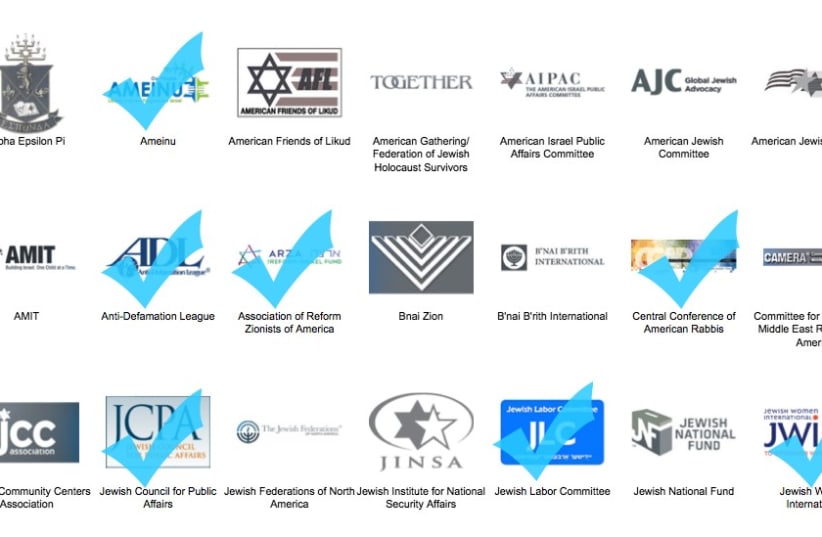The vote was 17 in favor of admission, 22 against, and three abstentions: the number of yes-votes was far lower than expected and rumored.
The significance of this particular vote – happening at a particularly polarized and emotional moment for American Jews as the latest peace talks seemed to fail – revolves around how big and inclusive of a metaphorical tent the American Jewish community is willing to pitch. Being admitted to the Presidents’ Conference “is a symbol of legitimacy,” Brandeis Prof. Jonathan Sarna said.
“Every community has its boundaries. The question really is, what is acceptable, and what are the communal bounds. I think that so many organizations have already turned out in favor of J Street, to some extent they’ve already won,” he said.
Many members had been very closed-mouthed on how they planned to vote in the days leading up to the ballot, but confirmed “yes” votes as of Wednesday morning included big players such as the Anti-Defamation League, the Union for Reform Judaism, the United Synagogue of Conservative Judaism and the Conservative movement’s Rabbinical Assembly. Other organizations included the Jewish Labor Committee, the Jewish Council for Political Affairs, Workmen’s Circle, the National Council of Jewish Women, Ameinu and Americans for Peace Now.
A source close to the process said that as of Wednesday morning, between 25 and 30 groups were expected to vote yes. One swing vote was the American Jewish Committee, which said in a statement that it would be “going into the meeting with an open mind.”
Rabbi Steve Wernick, CEO of the United Synagogue of Conservative Judaism and one assured “yes” vote in favor of inclusion, said that this issue is going to the core of “what are the authentic choices of the Jewish community as it relates to key issues, in this case Israel.”
“It’s not about the members,” he said. “It’s about what it [the Conference of Presidents] stands for, and who sits at the table.”
ADL National Director Abraham Foxman agreed with this view, saying to reporters on Tuesday that “we will support the admission of J Street not because we agree with them, not because we support their views, but in order to ensure the integrity and credibility of American Jewish advocacy and of the Conference of Presidents.”
“Membership in the Presidents’ Conference is deemed to be a sense of legitimization, much in the same way as the Palestinians at the UN,” Sarna said, acknowledging the awkward metaphor. “The Presidents’ Conference is seen as symbolic, and that’s why they [J Street] were eager to join and that’s why people will pay attention to the vote. I think that it will help to determine what the boundaries of acceptable discourse are: on the one hand, J Street had to make very clear that they supported Israel and opposed BDS, but on the other hand, they clearly disagree with a good part of the policies of the Jewish establishment.”
Several members of that establishment were swinging toward “no” before the vote.
The Zionist Organization of America issued a statement on Tuesday saying that J Street had shown itself to be an “extremist group hostile to Israel."
Morton Klein, president of the ZOA, last week issued an 18-point memorandum on what he called “some of their horrific, anti-Israel actions,” including endorsing the Goldstone Report, opposing Iran sanctions, and calling on the US administration to endorse a UN resolution that condemned Israel, which the US ultimately vetoed.
“It’s not simply that they disagree with the Israeli government,” Klein told The Jerusalem Post. “We’ve disagreed with the Israeli government. It’s that they’re fighting to harm and delegitimize Israel. We support a big tent. But do you support that anyone should be inside this tent? The principle is, where’s the redline?”
Farley I. Weiss, president of National Council of Young Israel and another “no” vote, echoed Klein’s words about J Street’s past actions toward the Jewish state.
“I think that what J Street is doing is trying to play down their actions and statements to get in,” Weiss told the Post. “They’re trying to say they’ll be part of the community, and won’t do these things they’ve done in the past. I think they have to stand by their record. But instead of running on their record they’re trying to play it down.”
Sarna couldn’t say whether the vote would mean a shift in the community’s dialogue, or even a split in the ranks. “I think a lot will depend on whether those big organizations conclude that they can no longer be part of the Presidents’ Conference [because of this exclusion], or whether there will be a sense that the advantages of speaking with one voice to the [Obama] administration outweigh these politics.”
Members of the conference told the Post that what J Street is doing is exploiting the situation to get visibility.
The Conference turned "down JDL [The Jewish Defense League] many years ago, and nobody made an issue and said ‘this is a test of how far the tent goes,’” said a member of the conference who preferred to remain anonymous . “This is not about the members of J Street. Three of our current presidents sat on boards of J Street, and they represent the same views... But they want to exploit this, so that if they get in, they can say ‘We were accepted so you know we’re credible,’ and if they don’t get in, then they get to say ‘We were excluded from the establishment.’”
The source emphasized that Jeremy Ben-Ami, the president of J Street, was given “every opportunity to be heard” during the campaign process that began several months ago, but “was not very convincing to many people."
J Street did not respond to a request for comment on the record.
